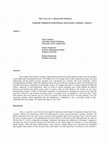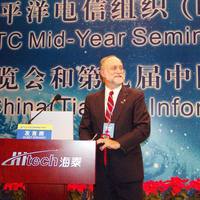Conference Presentations by Melanie Desmarais

The weight of the political economy of globalisation and business and commercial innovation has r... more The weight of the political economy of globalisation and business and commercial innovation has reframed social capital and citizenship discourses. The blanket role of sovereign states in their national governance has been undermined, and the global economy generates new expectations for economic and social citizenship. Critical Cosmopolitanism (Delanty, 2006) and complexity theory are used to discuss emergent scenarios of transformation in personal and business commitment in knowledge societies. We suggest that there is a deeper simplicity beneath the surface complexity of such phenomena. There are however various spiralling issues which amplify the dialectic between post-national and global across micro to macro scales in both business and society. At one level, homogenising, narrative schema of the global community of commitment is emerging as a macro-level script for survival as coherent or pre-eminent, sovereign entities. At another level, the interplay of ‘self’ and ‘other’ within both business and social relations can be viewed as a fractal of the global and local; core and periphery. The self-organising dynamic which destabilised the old equilibrium is amplifying
Teaching Documents by Melanie Desmarais
This activity is founded upon the authors research and work experience over a number of years. It... more This activity is founded upon the authors research and work experience over a number of years. It is used here as an experiential learning component of the executive programme and aimed at executives from diverse sectors, including the public sector. The exercise is usually run over at least two 3-hour sessions to enable teams to get some research and planning carried out before they return to present. The presentation includes some role-playing and a key aim is to place the teams in a business context that is both complex and challenging and which may they may not be familiar with. Some extra, ´surprise´ information may also be presented at times by facilitators, to simulate the unexpected effects of dynamic complexity on resilience of plans and robustness of leadership.
Papers by Melanie Desmarais
Social Science Research Network, Oct 5, 2017
Social Science Research Network, 2018
This activity is founded upon the authors research and work experience over a number of years. It... more This activity is founded upon the authors research and work experience over a number of years. It is used here as an experiential learning component of the executive programme and aimed at executives from diverse sectors, including the public sector. The exercise is usually run over at least two 3-hour sessions to enable teams to get some research and planning carried out before they return to present. The presentation includes some role-playing and a key aim is to place the teams in a business context that is both complex and challenging and which may they may not be familiar with. Some extra, ´surprise´ information may also be presented at times by facilitators, to simulate the unexpected effects of dynamic complexity on resilience of plans and robustness of leadership.

SSRN Electronic Journal, 2017
We will focus on updating the data on migration, technology and the overview of the three key soc... more We will focus on updating the data on migration, technology and the overview of the three key socio-economic aspects to the globalisation processes, which two of us outlined in 2007. The three C’s: that is comparative advantage; competitive advantage and collaborative advantage as we call them continue to dynamically interact in complex ways. Comparative advantage has always involved national level interactions as one nation traded its economic or social advantages against another. Thus those with better infrastructures, more resources, cheaper labour, and fewer restrictions have been able to bargain those advantages against other nations in such trading. The second C, competitive advantage, usually viewed as competition between firms rather than states, has seen increasing governmental involvement aimed at improving the competitive advantages of one nation’s firms relative to others. In an asymmetrically loaded world of unevenly distributed power and resources, the third C, collaborative advantage -- cooperating to leverage potential synergies to mutual advantage -- continues to dynamically evolve but in often paradoxical ways that both pose problems as well as offering some solutions.
SSRN Electronic Journal, 2007










Uploads
Conference Presentations by Melanie Desmarais
Teaching Documents by Melanie Desmarais
Papers by Melanie Desmarais